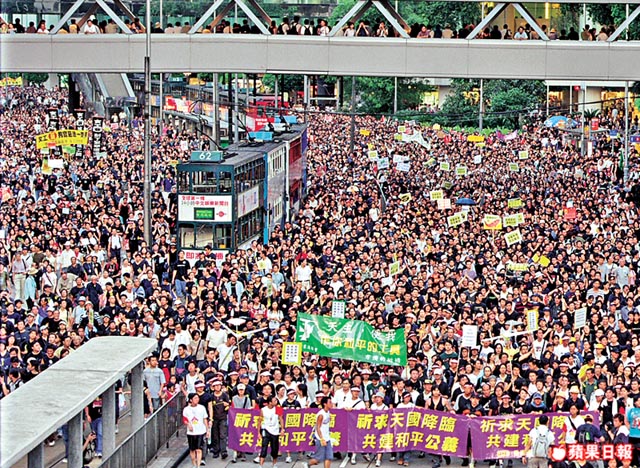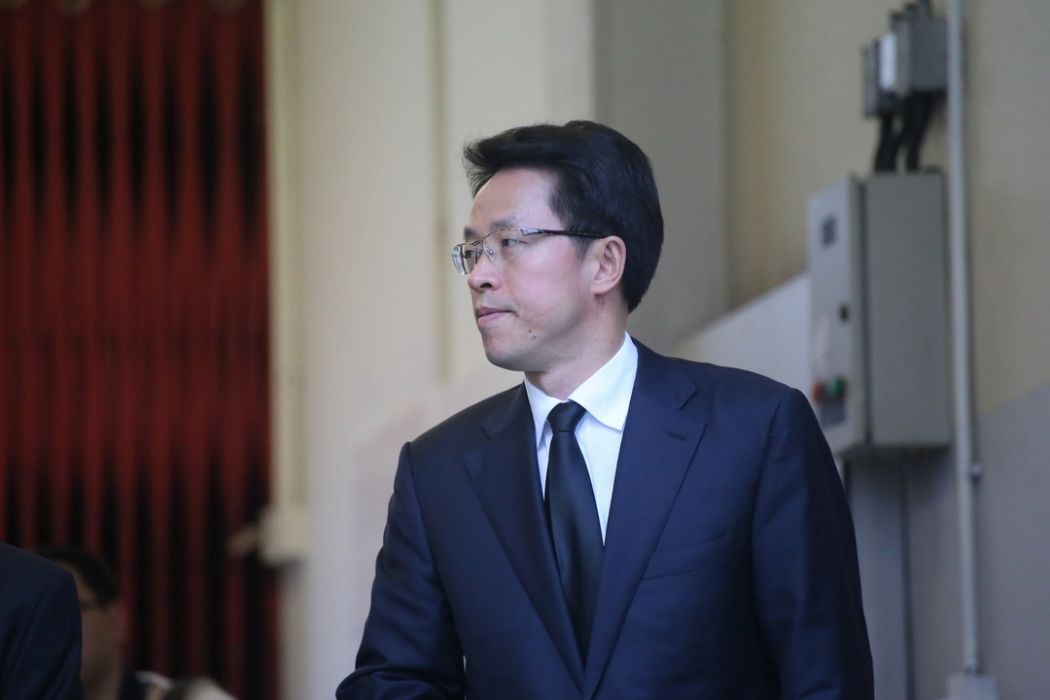Supreme Chinese leader Xi Jinping is obviously not pleased with Hong Kong. So much so that heads have begun to roll all up and down the line from Beijing to Hong Kong. Only our much-maligned leader, Chief Executive Carrie Lam, remains undisturbed… for now.
Like many others, Xi seems to have concluded that something must be very wrong. Otherwise, the city would not have erupted last year into months of civic unrest, initially over a government-proposed extradition bill and escalating rapidly into a broader political protest movement.

The protests culminated in an election that upended the lowermost tier of Hong Kong’s elected councils. Dominated for over a decade by pro-Beijing loyalists and their pro-establishment allies, all but one of the 18 District Councils emerged from the November 24 election with pro-democracy majorities. The winning candidates had mostly all endorsed the protest movement. They did so, and voters acquiesced, despite the violence involved and the economic losses that are now being compounded by the new coronavirus epidemic.
But unlike all others who know something is wrong, Xi is the man in charge, so the problem is his to solve and his alone. There is no one else who can intervene or overrule him.
To date, any specific solutions remain unclear. However, the first intimations of what seems to lie ahead have now appeared in a major leadership overhaul. They suggest hardline solutions rather than soft ones, without any hint of the open-minded reform initiatives that would calm Hong Kong’s political nerves.
Xi loyalists have replaced leading members of the specialised Hong Kong and Macau bureaucratic hierarchy that was created to administer the post-colonial Special Administrative Regions (SARs) after their return to Chinese rule: Hong Kong from Britain in 1997 and Macau from Portugal in 1999.
Macau is included under the same bureaucratic umbrella, but Macau is not the problem. Xi visited there late last year for the 20th-anniversary celebrations of its handover and pointedly praised Macau for being everything a good SAR should be: loyal to the central government in Beijing, obedient, and protest-free – or everything Hong Kong is not.
Bureaucratic integration
Not only are the new men Xi allies. They are also older, nearing retirement age, and have spent their entire careers working their way up the ladder, to become provincial governors and provincial-level Communist Party secretaries. They have lived and worked solely within the realm of domestic Chinese politics and have not needed to deal directly with the outside world except in rare transient ways.

Since the SARs are border regions, occupying space between those two worlds, Beijing’s new appointments look like an attempt to further its overall strategy of absorption – of gradually integrating Hong Kong into the mainland political system in all the ways that Hongkongers have been resisting for two decades, ways that Macau’s citizens have accepted with little complaint.
Together with bureaucratic streamlining, the appointments must be Xi’s attempt at a solution for Hong Kong’s waywardness. He must be hoping this new combination will prove more effective in achieving a transition from the original “One Country, Two Systems” model Beijing promised, into something more like One County, One System, that all Beijing’s many interventions anticipate.
Presumably, he is hoping this slow and steady evolutionary drift has a better chance of succeeding under the watchful gaze of men he can trust to get the job done, mainland-style. That would mean reducing the direct influence of younger specialised career bureaucrats trained to work in the “Two Systems” bureaucratic environment created by Beijing’s original promises about a “high degree” of post-colonial autonomy.
New men
The first appointment was announced in early January. Wang Zhimin, who headed the central government’s representative Liaison Office here, was unceremoniously recalled. At least for now, he has been relegated to the status of a minor functionary, presumably to take responsibility for all that went wrong in Hong Kong on his watch.
But much remains unclear. Was Wang being blamed for the protests and election outcome, or only because Beijing was blindsided by the debacle and he failed to raise the alarm in good time?
The new Liaison Office head is Luo Huining, whose arrival was as unexpected as Wang’s departure. Luo had risen through the ranks to head two inland provinces as governor and party secretary. During the Xi Jinping era, Luo made a name for himself as a corruption fighter in Shanxi province. Corruption is a major Xi target. But Luo has no prior SAR experience and was heading into retirement when tapped for the unfamiliar Hong Kong post.

During his introductory courtesy calls, he visited the neighbouring cities of Guangzhou and Shenzhen, where he pledged to work with provincial leaders in promoting the Greater Bay Area development plan. This aims to integrate Hong Kong and other cities in the Pearl River Delta region of Guangdong province, as part of an ambitious development project. The idea is said to be inspired by the California Bay Area and Silicon Valley in the United States.
A few days later he reinforced Beijing’s message with an article in the official party newspaper People’s Daily. The article blamed that old stand-by “foreign forces” for destabilising Beijing’s “One Country, Two Systems” plans for Hong Kong. The article called for passage of national security legislation and the attendant enforcement mechanisms as the most effective means of combating such infiltration and sabotage.
National security legislation sparked Hong Kong’s first big protest effort and successful pushback against the local government’s attempt to fulfil its responsibilities in that regard. A national security bill had to be shelved in 2003, for lack of enough votes in Hong Kong’s Legislative Council. The legislation remains shelved, hence Luo’s lament that it is still absent and so cannot be used to restore order in Hong Kong. Article 23 of Hong Kong’s post-1997 Basic Law constitution mandates that such legislation must be passed.
Beijing’s next major Hong Kong move took second billing since it was announced at the same time as the personnel changes in Hubei province. These replaced leaders being held to account for the bad management of Wuhan’s flu outbreak in December and January. Its real causes are, of course, China’s lax public health standards and obsessive public security concerns, but someone must be held responsible for so great a calamity.
By coincidence, a similar calamity occurred here, in 2003, due to the same combination of public health and public security reasons. They produced the deadly SARS (Severe Acute Respiratory Syndrome) epidemic. This, too, originated across the border, and information was initially withheld on security grounds, the very same kind of security mandate the government was just then trying to force legislators to introduce in Hong Kong. The SARS epidemic peaked in early 2003, and the massive precedent-setting anti-Article 23 protest march took place on July First, soon after the health all-clear was sounded. Hong Kong’s resistance has thus been years in the making.

Beijing’s current response entails an overhaul of the entire post-colonial bureaucratic hierarchy. The new man at the helm in Beijing is Xia Baolong, appointed in mid-February to head the Hong Kong and Macau Affairs Office (HKMAO). The HKMAO, under the central government’s State Council in Beijing, is the top body responsible for the day-to-day management of the two SARs.
Xia is another trusted member of Xi’s leadership team, but Hongkongers are not likely to be impressed by his credentials. He began as a city politician in Tianjin but moved on to qualify for appointments as governor and party secretary of coastal Zhejiang province. Before that, he was a deputy secretary and Xi was his boss as Number One in the province. The two men worked together in the early 2000s. Xia subsequently made a name for himself in his own right, as Party chief, not by fighting corruption but for carrying out an aggressive campaign against the Christian community and its churches. These have a long history and were reviving in parts of Zhejiang.
Administrative overhaul
What makes all this more interesting are the changes within the HKMAO itself. Until Xia’s appointment, the office was headed by Zhang Xiaoming, a leading member of the specialised post-colonial SAR management team. He’s still there but has been demoted to Number Two at the HKMAO.
As it happens, Xia also has a presence at the national level. For many years he was an alternate and then full member of the Communist Party’s Central Committee. He is now a deputy chairman of the honorary Chinese People’s Political Consultative Congress (CPPCC). Its national committee meets annually at the same time as the full National People’s Congress (NPC), usually in early March. The “two sessions,” NPC and CPPCC, are to be postponed this year due to the coronavirus flu epidemic.
But the CPPCC post gives Xia Baolong the rank of a state leader, which means a national state leader and trusted protégé of Xi Jinping now heads the HKMAO.

Zhang Xiaoming, demoted to deputy director status, has a rank that places him a notch below at ministerial level. Meanwhile, the two heads of the Liaison Offices in Hong Kong and Macau have also been made HKMAO deputy directors, giving them the same rank as Deputy Director Zhang, who continues to lead the day-to-day work of managing SAR affairs.
All this aims at providing clarity for the chain of command and communications, for reporting up and sending orders down, and coordinating work while keeping everyone on the same wavelength. The new arrangement also places them all in an equal and subordinate position to the new man at the top, Xia Baolong, who is a close ally of Xi Jinping.
Actual policymaking occurs at yet another level above, known as the Central Coordination Group for Hong Kong and Macau Affairs. Since the first major upsurge of Hong Kong anger in 2003, this group has always been headed by a member of the Communist Party’s topmost Political Bureau Standing Committee.
But toward what end?
Still unclear is what Xi might do next, now that the overlapping lines of communication have been sorted out and tidied up. Does he think he was receiving the wrong information about events in Hong Kong? Or is the Liaison Office being blamed for the events themselves? Since its role is as a liaison, not direct governance, the office itself can hardly be blamed for Hong Kong’s rebellious mood.

Presumably, Hong Kong’s new Liaison Office director did not write that People’s Daily opinion piece himself. It was probably drafted for him by the old team in the HKMAO secretariat. And they had no choice but to follow the official line mandated by Beijing’s ever-present political security concerns. Hence, Hong Kong’s troubles are the result of foreign force infiltration and sabotage. According to this diagnosis, relief can only come with the passage of Article 23 national security legislation and the creation of “mechanisms” to enforce it.
Director Luo is said to be a soft-spoken man with a knack for solving difficult problems. If he can use the new streamlined channels of communication to correct the official narrative on Hong Kong resistance and foreign force infiltration, he would at least be taking a step in the right direction. Otherwise, the reports he sends up the line will be as misguided as the directives coming down.
